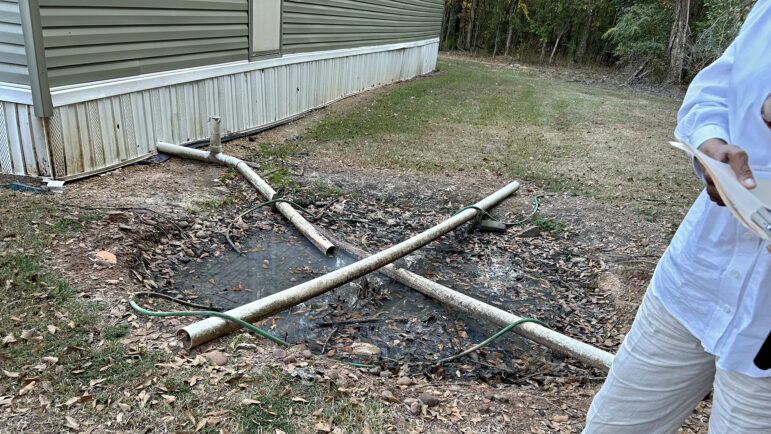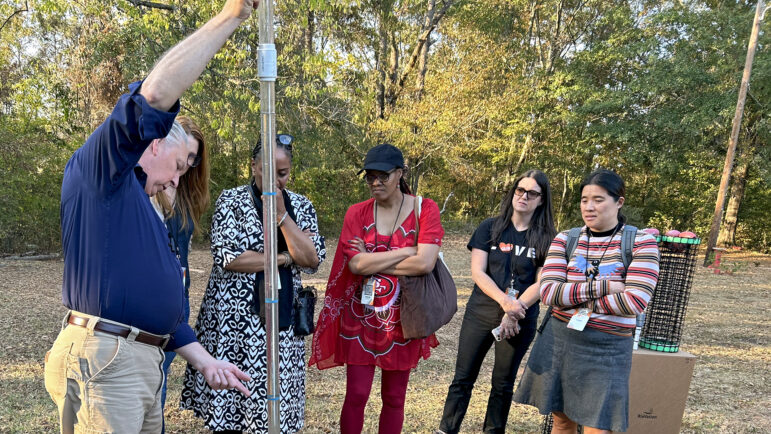Amid sewage issues, a nonprofit is helping Alabama Black Belt residents find solutions
Stephen Moeller, of RioVation, demonstrates how his company’s equipment uses microorganisms to treat waste on Monday, October 28, 2024, in Tyler, Alabama. Moeller’s company is working with the Black Belt Unincorporated Wastewater Program to come up with solutions to onsite wastewater problems.
On a late October afternoon, Sherry Bradley gets out of her car and stands in the backyard of a manufactured home in Lowndes County, Alabama. She’s joined by GLIDE, a national center for social justice based in California, and Perman Hardy, who helped her form the Black Belt Unincorporated Wastewater Program (BBUWP) several years ago to tackle the region’s poor sanitation issues.
Poor sanitation has long been a problem in the Alabama Black Belt, which is known for its rich soil. While it’s good for growing crops, the soil presents a problem for most traditional sewage systems.
The goal on this day is for Bradley and Hardy to show the progress their organization has made to alleviate the region’s sanitation problem. But as Bradley puts it, she likes to show “the good, the bad, and the ugly,” so she takes them to two sites that show opposite sides of the sewage issues in Lowndes County.
This stop is in a rural part of the county. The home has a pipe leading out into the homeowner’s yard. Bradley tells the GLIDE representatives that this is a typical “straight pipe,” a term used to describe the practice of directly dumping sewage from a home or building into the environment. For many homes in this region, that means their yards.
Bradley said it’s a symbol of the region’s underlying issue.
“A straight pipe results when a person cannot afford the (septic) system,” she said.

Specialized septic systems that can work with the Black Belt’s soil can cost at least $28,000 — money many in this region don’t have.
Alabama’s previous criteria for funding water infrastructure, like only allowing public bodies like towns or county boards to apply for it, have made it difficult for residents to address sanitation issues themselves.
That’s where organizations like Bradley’s and Hardy’s come in. They’re part of a collection of people and groups working to come up with solutions to the sewage problems plaguing the region.
BBUWP applies for government funding that can afford septic systems for residents and then installs the septic systems for them. They also work with other organizations, like the Consortium for Alabama Water and Wastewater Treatment, to monitor and evaluate those systems.
“We’ve been blessed enough to get grant after grant after grant,” Bradley said.
That funding includes millions of dollars from the United States Department of Agriculture and the American Rescue Plan Act. Last year, the Environmental Protection Agency gave the group and its partners more than $14 million to help treat 350 homes in Hale, Lowndes and Wilcox Counties. BBUWP has helped over a hundred households, and Bradley is hopeful they’ll be able to help even more in the future.
Hardy grew up in Lowndes County, where according to census data, thousands face similar sanitation issues.
“I’m quite sure issues like this are all over the United States, but in the rural parts, you’ll find it more frequently than you would probably in other areas,” Hardy said.
To do this work, Hardy said that getting community buy-in has been key.
“Once you build trust, when you need something and you tell people change is about to happen, they receive it better because you’ve built that relationship,” Hardy said.
In the meantime, Hardy and Bradley are celebrating the little victories, like the now functioning system they installed for one older woman living in Lowndes County.
After driving for a while, the two women and the touring group arrive at a red-bricked house. They get out of the car and go behind it, where two men are waiting for everyone to arrive.
“What I want you to do is follow this gentleman and this gentleman, and they’re going to show you the results of that RioVation system on top of the septic tank system,” Bradley says to the group.
One of those men is Stephen Moeller, who works with RioVation, a company partnering with Bradley and Hardy to come up with sewage solutions for at-home wastewater treatment challenges.
Moeller stands beside what looks like a small black box located above ground. Next to it are two covered holes. The black box, known as the RioVation BioMaze, is an air pump designed to create oxygen-rich conditions. The idea is to create an environment for microorganisms to grow that helps treat the water.

“We just give them the right environment with the oxygen and then the structure for them to populate on, and they eat all of the waste,” Moeller said.
The result is something that isn’t potable, meaning you can’t drink it, but it does take away the smell of the water and gets it clear, and is advertised as being “high in dissolved oxygen and aerobic bacteria.” RioVation has shared testimonials from homeowners who have purchased a BioMaze on its website. The company is allowed to install the system without written consent from the state of Alabama.
Addressing residential wastewater systems is just one solution that groups are using to fix sewage issues. Other solutions include upgrading and expanding the systems of existing municipalities with sewers and identifying clusters of homes that could share a sewage system.
The goal is to help homes across Central Alabama get proper sanitation.
This story was produced by the Gulf States Newsroom, a collaboration between Mississippi Public Broadcasting, WBHM in Alabama, WWNO and WRKF in Louisiana and NPR.
Supreme Court blocks redrawing of New York congressional map, dealing a win for GOP
At issue is the mid-term redrawing of New York's 11th congressional district, including Staten Island and a small part of Brooklyn.
Video of Clinton depositions in Epstein investigation released by House Republicans
Over hours of testimony, the Clintons both denied knowledge of Epstein's crimes prior to his pleading guilty in 2008 to state charges in Florida for soliciting prostitution from an underage girl.
Some Middle East flights resume, but thousands of travelers are still stranded by war
Limited flights out of the Middle East resumed on Monday. But hundreds of thousands of travelers are still stranded in the region after attacks on Iran by the U.S. and Israel.
‘Hamnet’ star Jessie Buckley looks for the ‘shadowy bits’ of her characters
Buckley has been nominated for a best actress Oscar for her portrayal of William Shakespeare's wife in Hamnet. The film "brought me into this next chapter of my life as a mother," Buckley says.
How, who, and why: NPR flips its famous letters to defend the right to be curious
NPR is standing up for the public's right to ask hard questions in a national campaign dubbed "For your right to be curious." At NPR's headquarters, on billboards in New York City, Chicago, and Washington, D.C., and across social media, NPR's three iconic letters transform into "how," "who," and "why" — a bold declaration of its commitment to fight for Americans' right to ask questions both big and small.
Oil prices surge, but no panic yet, as Iran war continues
Global oil prices are in the high $70s as traffic through Strait of Hormuz comes to a halt. Some analysts have warned they could top $100 a barrel if the stoppage is prolonged.







